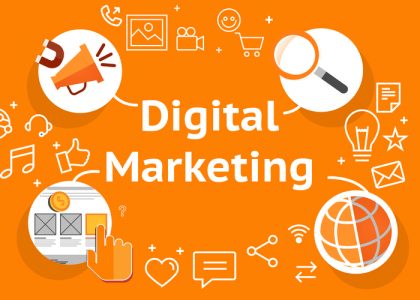In today’s digital age, marketing has evolved dramatically. Traditional methods are no longer sufficient to reach and engage the modern consumer. This is where digital marketing steps in. To thrive in the competitive online landscape, understanding the fundamentals of digital marketing is essential. In this comprehensive guide, we will break down the core concepts, strategies, and tactics that define the world of digital marketing.
Understanding Digital Marketing
Digital marketing encompasses all online efforts to connect with your target audience, promote your brand, and drive desired actions. This can include a wide range of online channels and methods, each serving a specific purpose in the marketing mix.
Key Components of Digital Marketing
1. Search Engine Optimization (SEO): SEO is the process of optimizing your website to rank higher in search engine results. It involves on-page and off-page strategies, keyword research, content optimization, and technical aspects like website speed and mobile-friendliness. The goal is to improve your website’s visibility on search engines like Google, attracting organic, high-quality traffic.
2. Content Marketing: Content is at the heart of digital marketing. Quality content attracts, informs, and engages your audience. A successful content marketing strategy involves creating valuable content, which may include blog posts, videos, infographics, and more, to address your audience’s needs and interests.
3. Social Media Marketing: Social media platforms provide an avenue to interact with your audience and build brand awareness. Each platform has its own unique characteristics, and an effective strategy involves creating engaging content, fostering a community, and leveraging advertising options.
4. Pay-Per-Click Advertising (PPC): PPC campaigns, such as Google Ads and Bing Ads, allow you to display ads to your target audience and pay only when they click on your ad. PPC is a highly targeted and cost-effective way to drive traffic and conversions.
5. Email Marketing: Email marketing remains a powerful tool for building and nurturing customer relationships. It involves creating and sending tailored emails to your subscribers to inform, engage, and convert.
6. Analytics and Data Analysis: To measure the success of your digital marketing efforts, you need to gather and analyze data. Web analytics tools like Google Analytics help you track website traffic, user behavior, and conversion rates. This data informs your decision-making process and enables continuous improvement.
Creating a Successful Digital Marketing Strategy
A comprehensive digital marketing strategy combines these components into a cohesive plan tailored to your business goals and target audience. Here are some essential steps to create a successful strategy:
1. Set Clear Goals: Define what you want to achieve with your digital marketing efforts. Whether it’s increasing website traffic, generating leads, or boosting sales, clear goals will guide your strategy.
2. Understand Your Audience: Know your target audience’s demographics, preferences, and pain points. This knowledge will inform your content and messaging.
3. Content Planning: Develop a content strategy that addresses your audience’s needs and aligns with your goals. Consistent, high-quality content is key.
4. Optimize for SEO: Incorporate SEO best practices into your content and website to improve visibility in search results.
5. Leverage Social Media: Choose the platforms where your audience is most active and engage with them through regular posting and community building.
6. Implement Paid Advertising: Utilize PPC campaigns to reach a wider audience and drive traffic to your site.
7. Email Marketing: Build and segment your email list, and create personalized email campaigns to nurture leads and retain customers.
8. Measure and Optimize: Regularly review your analytics to track performance and make data-driven adjustments to your strategy.
Conclusion
Digital marketing is an ever-evolving field that offers a multitude of opportunities for businesses to connect with their audience and achieve their goals. By understanding the fundamentals and implementing a well-structured strategy, you can harness the power of digital marketing to grow your brand, engage your audience, and drive success in the online world. Whether you’re a small startup or a well-established corporation, digital marketing is an indispensable tool for reaching your marketing objectives in the digital age.





